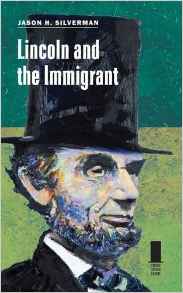Lincoln and the Immigrant by Jason H. Silverman. Southern Illinois University Press, 2015. Cloth, ISBN: 978-0809334346. $24.95.
 As an issue, immigration lends itself to an exegesis of Abraham Lincoln’s pronouncements and actions. It sends successive generations of Americans into a panicked search for just the sort of wisdom that a prophet of nationalism and equality might provide. Jason H. Silverman’s recent contribution to the Concise Lincoln Library is, therefore, at once timely and overdue. In 159 short pages, Silverman covers Lincoln’s interactions with foreign-born Americans and his positions on policies that affected their lives. The writing is sharp and engaging, the details revealing, and Silverman’s insights interesting, but he leaves plenty of room for other historians to join the interpretive pursuit.
As an issue, immigration lends itself to an exegesis of Abraham Lincoln’s pronouncements and actions. It sends successive generations of Americans into a panicked search for just the sort of wisdom that a prophet of nationalism and equality might provide. Jason H. Silverman’s recent contribution to the Concise Lincoln Library is, therefore, at once timely and overdue. In 159 short pages, Silverman covers Lincoln’s interactions with foreign-born Americans and his positions on policies that affected their lives. The writing is sharp and engaging, the details revealing, and Silverman’s insights interesting, but he leaves plenty of room for other historians to join the interpretive pursuit.
It is surprising that Lincoln and the Immigrant is the first book-length study of the subject. Immigrants made up about 13 percent of U.S. residents in 1860, not to mention a good quarter of Union soldiers; moreover, their significance, reaches beyond raw numbers. The Irish and Germans arrived with their own distinctive histories of fighting for national independence and national unity, and they picked their own peculiar paths through the American racial system of black and white. To the west, much smaller numbers of Chinese immigrants and residents of what had recently been Mexican territory troubled the racial binary, raising different questions of inclusion and power. Beginning during Lincoln’s congressional term in the late 1840s and stretching through the Civil War, immigration was a live issue closely related to his hallmark concerns.
Silverman understands the principles at stake, but his strength lies in compiling interesting stories. In Springfield, for example, Lincoln did business with Portuguese immigrants, buying produce from one man and lending $125 at 10 percent interest to a woman who offered a small parcel of land as security. He befriended a Swedish Lutheran minister who taught at his son’s school and formed close political relationships with other Scandinavians. He counted among his confidantes several Jewish immigrants from England and German Europe (Silverman groups them together, separate from other English and German immigrants, without comment). Abraham Jonas was an ally in Whig and then Republican state politics, and Isachar Zacharie later served as presidential chiropodist and made secret wartime missions to Richmond and New Orleans.
Politics and prejudice combined to complicate Lincoln’s relationship to the era’s largest immigrant group, the Irish. An Anglo-Protestant worldview animated his Republican Party, and while Lincoln famously rejected the discriminatory policies of the nativist Know Nothings, he sometimes dismissed Irish Catholics as Democratic pawns. He held them in low esteem, in part because they supported pro-slavery politicians. Silverman relates a joke that captures both Lincoln’s habit of disparaging the Irish and his conviction that the accident of birth should not disqualify a white man from acquiring American citizenship. In rebuking the Know Nothings, Lincoln reportedly said that he had asked the Irishman hoeing his garden why he was not born in the United States. Pat, the gardener, replied, “Faith, Mr. Lincoln… I wanted to be, but my mother wouldn’t let me” (61).
German immigrants were slightly less numerous but more likely to agree with Lincoln, so he conferred more attention on them than any other immigrant group. Silverman neatly recounts Lincoln’s attempts to learn German in Springfield, which were disrupted by the student’s signature humor. Lincoln was certainly joking when he later said he was almost bilingual, but he developed intimate political relationships with German-born politicians. Educated men such as Gustav Koerner, Friedrich Hecker, and Carl Schurz shared many of his views and influenced an important segment of the Midwestern vote. Silverman astutely summarizes familiar episodes such as Lincoln’s investment in Springfield’s Illinois Staats-Anzeiger newspaper.
In the White House, Lincoln’s principles and experiences affected policy. He saw to it that General Ulysses S. Grant revoked his notorious order to expel Jews from territory he controlled, negotiated the sensitivities of immigrant soldiers and officers such as Franz Sigel, and supported the Immigration Act of 1864, which encouraged immigration from Europe.
Among Lincoln’s encounters and interventions, the reader will find Silverman’s interpretations. Silverman argues that although Lincoln believed Asians and Latin Americans were backward, the process of justifying a place for Europeans in the United States enhanced his naturally expansive vision of the country. Silverman writes, “Paradoxically, Lincoln’s understanding of whiteness would move him to embrace a broader interpretation of such concepts as equality, human rights, and natural rights than it would most of his contemporaries” (29). Silverman also notes that Lincoln explicitly tied opportunities for immigrants to the Declaration of Independence, and that European-born men fit perfectly within his economic vision. They personified the free labor ideology’s tenet that the United States offered industrious workers the chance to achieve economic independence, thereby demonstrating the country’s exceptionalism. Silverman concludes that Lincoln’s empathy reinforced his superior appreciation of American values.
A short book privileging personal interactions is not the best place to look for a critical assessment of Lincoln’s ideas. We hear little from the majority of immigrant voters who never supported Lincoln, partly because they accepted slavery and feared residual Know Nothingism, but also because they thought the Republican approach to development, education, and alcohol favored wealthy and self-righteous native-born Protestants. Contrary to Silverman’s depiction, about half of German Americans always supported the Democrats. Misrepresenting this point weakens his whole characterization of ethnic politics. The disjuncture between political allegiances and Lincoln’s obvious personal warmth also suggests that historians should perhaps be wary of overemphasizing kindness. Finally, the structure of Lincoln and the Immigrant serves to minimize facts that Silverman acknowledges: the president used the word immigrant as a synonym for “European-born man,” and he valued immigrants in part for the labor they contributed to a growing economic power. There are certainly historians who would look beyond Lincoln’s own frame of reference and stress how race, gender, class, and economic interests structured his private dealings and his politics. In the meantime, there is much wisdom in the observation that one of greatest spokesmen for American nationalism was convinced that personal prejudice formed a poor basis for policy, and that immigration was a positive good.
Alison Clark Efford is Associate Professor of History at Marquette University and the author of German Immigrants, Race, and Citizenship in the Civil War Era (2014).



